Sometimes, it’s just a matter of getting started!
You know when you have a task looming in front of you, and you’re just not sure where to start – or how to start, or the best way to start?
Sometimes, the key is just starting! And with that in mind, here’s my start on my first embroidery projects that will materialize into Something of Some Sort in 2020.
The way I go about projects and the way you might go about projects is probably slightly different, just because I use the projects I do as demos here on the website, or as possible kit or e-book content, or as a springboard for tutorials and so forth.
But in some respects, our approach would be the same. So here’s my start! And maybe it will give you some ideas on how to start your own potential project, too.
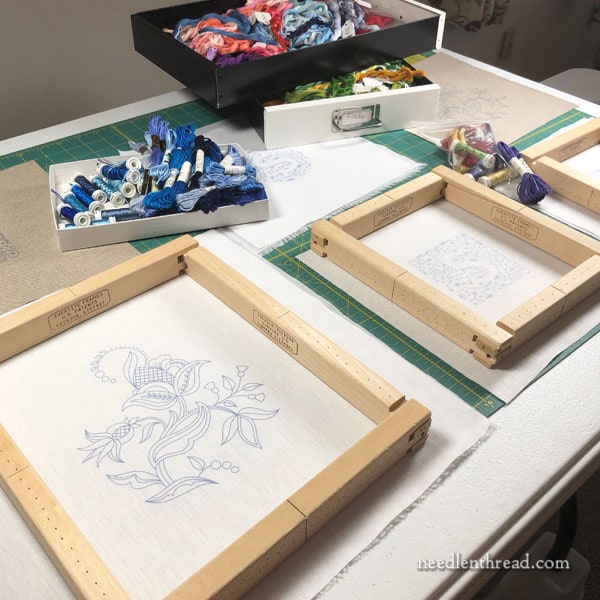
There they are!
I know, I know. It looks like a lot of embroidery projects all at once. In fact, it’s only two, with variations.
The first thing I did was tweak the designs on my computer, so that I could have clean line drawings to use as my embroidery designs. This is important for me, if I plan to make the designs widely available in any e-book or a kit or what-have-you. I don’t want to spend the time stitching a design that might change in a major way, because then I would have to re-stitch it. So I need to make sure my design (and any variations) are where I want them to be.
It is true that I may learn as I go that a design isn’t going to work, or that it needs a major adjustment. But with these particular projects, I’ve already toyed with stitching them and I’ve got the designs where I want them.
This step of tweaking and modifying designs may not be necessary for you – you might start with a simple sketch, hand-drawn, and that will do it. Or you might a purchased design that you’re going to stitch – and that’s fine, too!
Read More about Preparing Designs
You can read about how I prepare my designs for hand embroidery here.
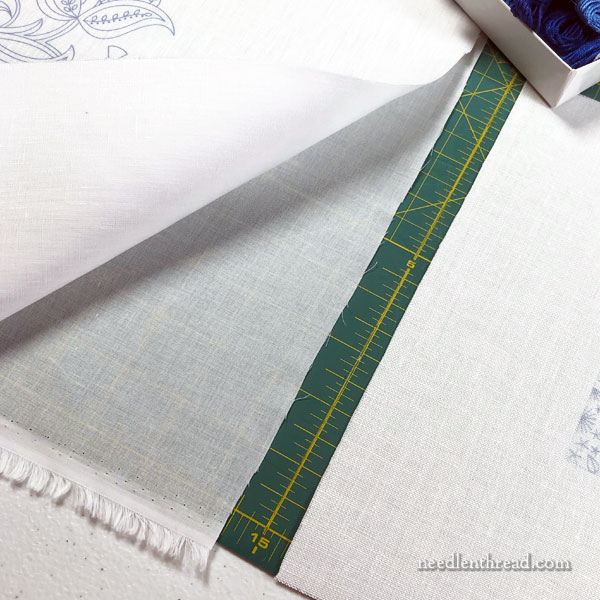
Then, it’s time to select and prepare fabric.
I’m a linen gal, myself. I do most of my surface embroidery on linen of some sort, although occasionally, for certain types of embroidery, I will use cotton, silk, or wool, or some combination thereof.
I had a such a great experience stitching on the Tailor’s Chalk linen on my Snowflakes that I published before Christmas that I knew I wanted to work at least one variation of each of these projects on that linen.
But because I’m planning on fairly full-coverage stitching, I wanted to back the linen (which is relatively light) with another layer of fabric. In this case, I’m using a cotton batiste. This keeps the whole effect of the ground fabric rather light, but it gives more support for the stitches.
Read More About Fabric for Embroidery
You can read about various linen for hand embroidery here.
You can read about how I prepared linen for a big embroidery project here.
And you can read about backing embroidery ground fabric (and when and how) here.
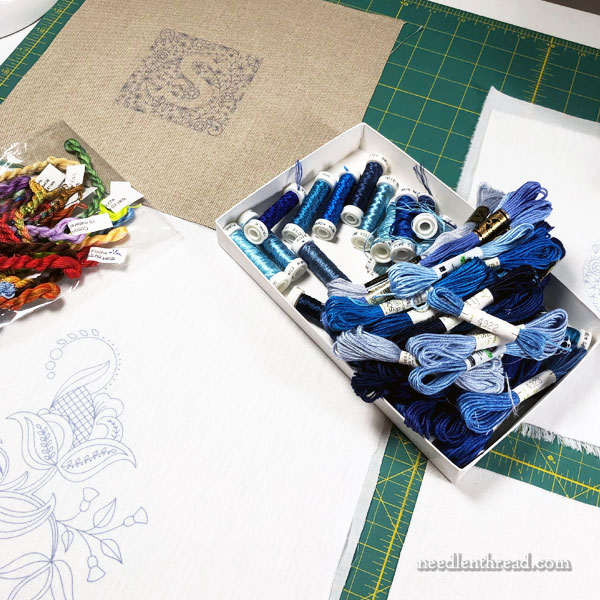
I’m also using a natural linen for a couple of variations. The natural colored linen you see in the pictures is called Sunflower Seed from Access Commodities (available through fine needlework shops). The natural linen does not need a backing fabric.
I’ve also got my threads all picked out, as you can see from the blue heap in the middle of the table.
One of the project variations will be worked in blues, in silk, and that’s what that heap of thread is. The other variation will be stitched in DMC cotton floss, in blues. I’m pretty sure they’re at the bottom of that heap of blue!
Now, I probably won’t use every single thread in that heap. I’ll pick the ones that work best for the effect I want, and I’ll take notes as I go, so I know which threads I’m using. I’ll eventually put the threads I’m not using aside, and sail on from there.
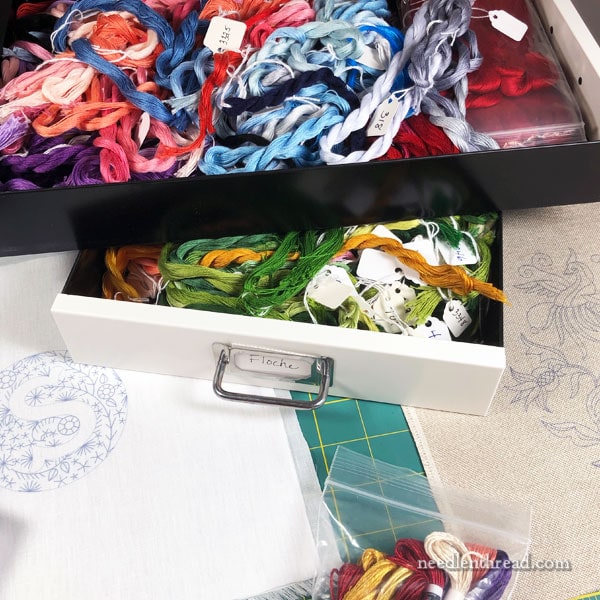
I mentioned the overdyed floche that I’ll be using on one of the projects just the other day.
I’m supplementing the overdyed floche with solid colors of floche, and so I have my floche drawers out. I’ll select colors as I go and make notes of which ones I use where. I definitely won’t be using all 90+ colors of the thread! But, when you’re first working through a project like this, it’s nice to have a selection of colors to pull from, to get just the color effect you want.
Read More About Silk and Floche
You can read more about stitching with silk embroidery threads (and different types of silk) in the following articles:
Silk Embroidery Thread 101: Getting Started with Silk
Silk Embroidery Thread 101: Twisted Filament Silks
Silk Embroidery Thread 101: Flat Silks
You can read more about floche in these articles:
Three Good Reasons to Try Floche
Cotton Floche vs Coton a Broder Up Close
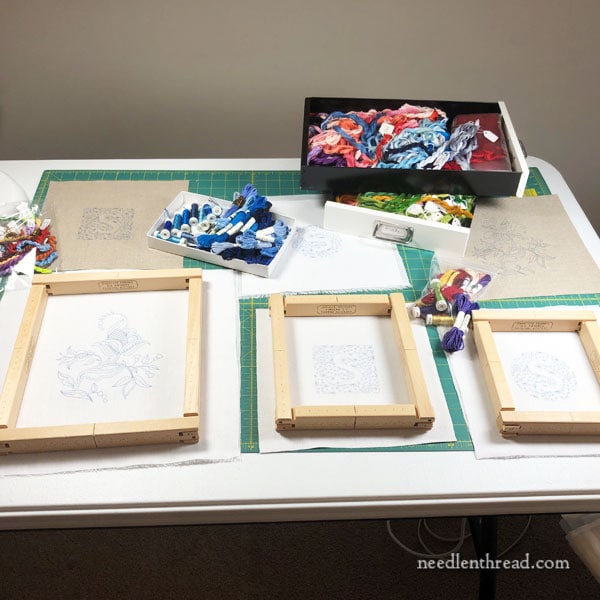
And I’ve pulled out a few stretcher bar frames to set the projects up on, so that they’re ready to stitch when I’m ready to stitch.
For the smaller projects (the “S” initial), I could use a 5″ hoop, but I like using stretcher bar frames and the like when I’m working on something that I’ll be hopefully photographing (and videoing) along the way. It gives a more open area around the stitching for photos.
I also want to make sure the designs fit inside the ring of the hoop or the sides of the frames, because I plan to use some beads on a couple of the variations.
Whether you’re using a frame or a hoop doesn’t matter so much with regular surface embroidery. If you’re adding beads or metal threads to your embroidery, you’ll want to make sure the design fits inside the hoop or frame.
The whole point of a hoop or frame is to hold the fabric drum taut – this will give you the best results at the end of the project. Use whichever you’re most comfortable with, that works best for you, but make sure your fabric is drum taut and not warping and wobbling about inside the hoop or frame.
Read More about Hoops & Frames
You can read about Evertite stretcher bar frames and how to set them up here.
You can read about using a hoop or a frame here.
You can read about choosing a good hoop here.
You can read about binding a hoop for hand embroidery here – a method that helps keep fabric clean and taut.
You can read about how I like to set up my embroidery hoop here.
And That’s a Start!
Lots of tips and tutorials generally spin out of the projects that I do, so I’ll share those with you along the way, with progress and whatnot. The tips and tutorials that I share can be applied to any hand embroidery projects, not just my projects, so in that way, we can all learn together.
I like to share my pitfalls and (hopefully) methods of recovering from them, too – because we all have pitfalls now and then!
And eventually, once I know the designs, colors, threads, and stitches all actually did work together as planned to create a harmonious and pleasing project, I’ll make all that information available, too.
So now I’m off! I’m excited! Fun times ahead!


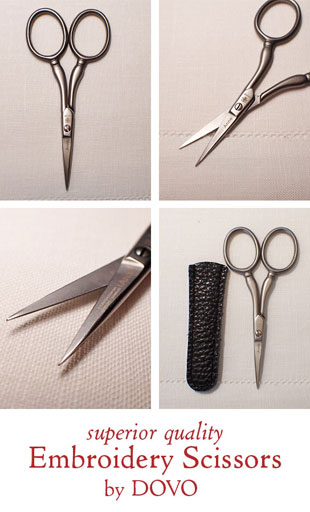
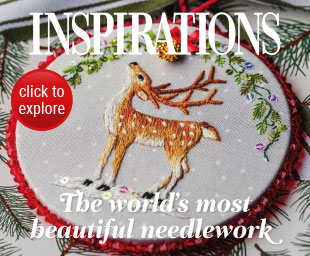
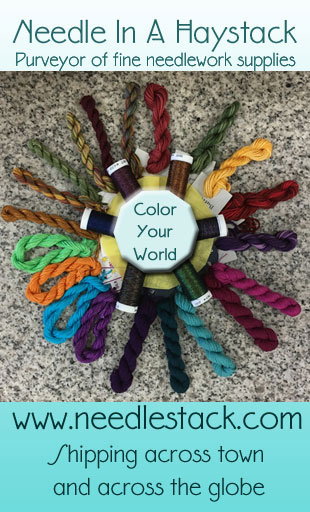
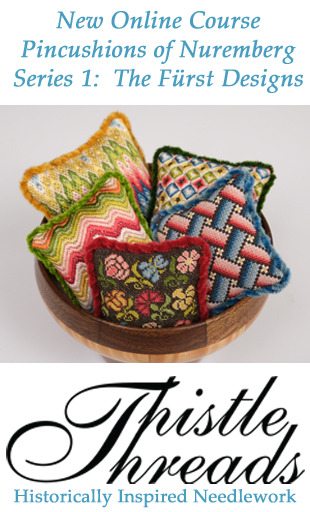
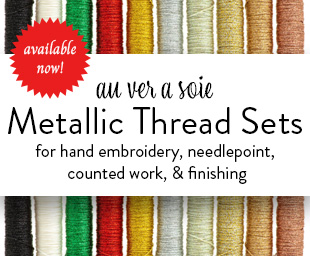
Good day Mary, now this looks like a great start! I do enjoy preparation phases when possibilities are all open. I will be looking forward to the development of theses projects. Now, I have a question regarding the goldwork piece you where salvaging a figure stitched on cloth of gold fabric a few years ago, I am referring to the one in you June 2018 post. Did you end up finishing it, is it still a wip or has it been dismissed altogether? Just curious!
Oh, Ginette, it is my cloud hanging over my head! I have not finished it yet. It is still waiting for me. I got stuck on one thread decision, set it aside, and I have yet to get back to it. I want to finish it for sure this year, but we shall see!
Happy stitching, miss Corbet, looking forward to the end result.
I love the “S” initial embroidery 🙂
Mary, this article is just super ! I am really enjoying reading your “ways” of getting ready to put projects together ! You make my fingers “itch” to get started on something new ! Happy 2020 !
Oh Mary, I can’t wait to see the S. I’m looking at doing a Z, so I’ve been searching through initials, hunting for the perfect one.
I forgot that you boil and cool your linen. I sew mine, throw it in wash on hot, line dry, and repeat. I tend to do a yard at a time. On the second go, I press it while still slightly damp. I’m finishing a table cloth that was started 20 years ago, by someone else. And I’m worried, since the fabric was never washed. Fingers crossed.
Hi Mary, great article. Just wondering about tweaking your design on the computer. I am looking for an embroidery design app for my iPad. Would you please discuss more about your computer application.
Many thanks, Robbin, BC Canada
Hi, Robbin – Thanks for your question! You’ll find a link in the article above to a previous article on that very topic. 🙂
First let me say that ever thing you write is so informative and educational! I read every word. I’ve not used Floche threads but want to try them when my embroidery gets better! For now DMC is just fine.
I absolutely LOVE Jacobean style embroidery and fabrics. I’m extremely anxious to see the colors you choose and hope you make it available in an ebook in the future!
Thank you for all your wonderful education!
Mary,
Have you ever posted anything about a color wheel, to help those of us that like to embroider but have trouble picking colors that go together?
Thank you for your time.
Mary
I haven’t specifically written about using a color wheel, because that’s not how I choose colors. I choose colors more by instinct, based on what I like. I’m a firm believer that, when we embroider, we must like our color choices, and not just choose colors based on formulas. Otherwise, for many of us, we end up quitting on a piece, because we don’t necessarily like the colors that the formula gave us. While there is such a thing as color theory, and while the color wheel can be a useful tool in exploring color theory, it is not an absolute. Color is more often a personal choice, based on preferences. All that said, I think this book is extremely helpful for picking color palettes and for understanding color theory: https://needlenthread.wpengine.com/2017/03/colour-confident-stitching-a-gem.html (That’s a link to my review, so that you can see what it’s all about.)
I’ve been doing some prep work, too, Mary. Just today I received my new Needlework System 4 floor stand. That was my chosen Christmas present, and is it ever exciting. Well, it was after I figured out how to put it together. I used the photos from your review to figure it out. 🙂
I’ve also been getting some Swarovski beads to finish a project I’m almost done with. They are so beautiful, I could order a bazillion of them … and I probably will, but I have what I need for now, so I must stop buying them.
And I’ve just ordered my first silk threads, with a specific project in mind. Another new mountain to conquer, but – again – I figured out what I wanted from the many choices by using your silk 101 series. You’re always my first – and best – source of information before I spend money.
So Happy New Year, Mary. And if I ever get such a large heap of blue threads like yours – all in silk! – then I’ll probably have to stop getting your emails. 🙂
Oh, Gee – I know exactly what you mean about the Swarovski beads! It’s hard to stop buying beads, once you start adding beads to your embroidery. I’m a sucker for them! I’d love to have the whole line of Miyuki seed beads (15/0 round) to play with. But that would be dangerous!
Hi love ur ideas.. Can u perhaps tell me where I can get those embroidery iron on transfers
Hi, Jayshree – I’m not using iron ons here. These are my own designs and they’re not available just yet. Sorry!
What a lovely start for the New Year! May I ask what pattern you are using for your crewel piece ?
Hi, Tina – I’m not doing any crewel in this round, I’m afraid. Just silks and cottons. The Jacobean-type design is my own, if that’s the one you’re inquiring about. I’ve shared a version of it on my Patreon page, but I’m going to work through the design before making it available here on the website. There are two versions – one has a bird in it and the other doesn’t.
I must say those draw fulls of thread are very inspiring, Mary, and I look forward to seeing how you use those delicious shades of blue! I will enjoy following your progress with all of these designs. 🙂